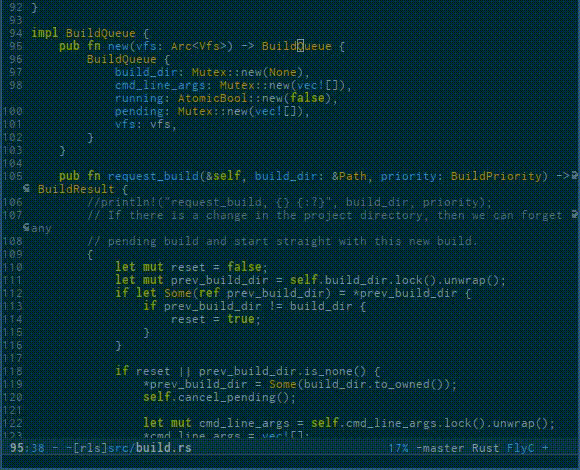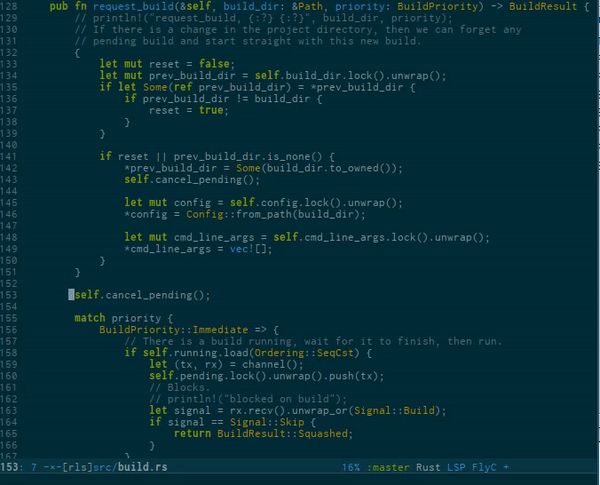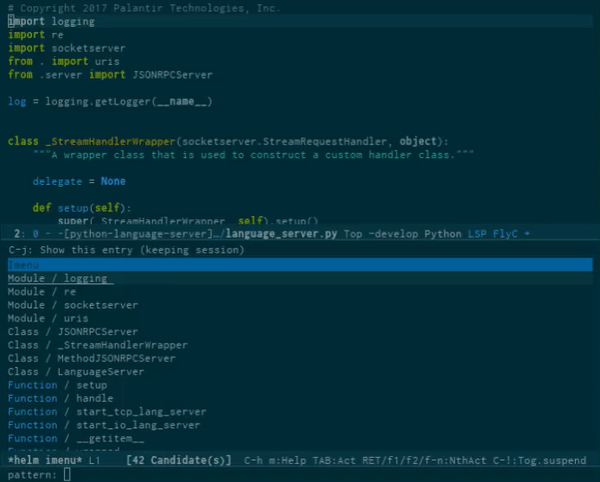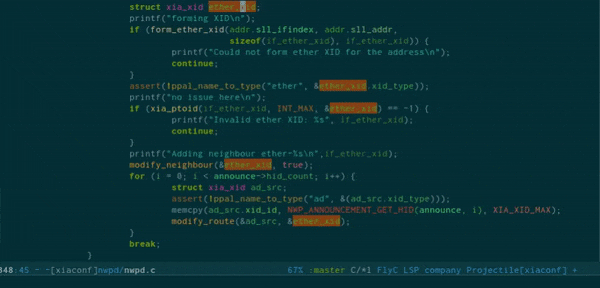emacs-lsp
A Emacs Lisp library for implementing clients for servers using Microsoft's Language Server Protocol (v3.0).
The library is designed to integrate with existing Emacs IDE frameworks (completion-at-point, xref (beginning with Emacs 25.1), flycheck, etc).
Note: Starting from version 4.0, flycheck support has been moved to the package lsp-ui
Installation
Clone this repository to a suitable path, and add
(add-to-list 'load-path "<path to emacs-lsp>")
(require 'lsp-mode)
(lsp-define-stdio-client
;; This can be a symbol of your choosing. It will be used as a the
;; prefix for a dynamically generated function "-enable"; in this
;; case: lsp-prog-major-mode-enable
lsp-prog-major-mode
"language-id"
;; This will be used to report a project's root directory to the LSP
;; server.
(lambda () default-directory)
;; This is the command to start the LSP server. It may either be a
;; string containing the path of the command, or a list wherein the
;; car is a string containing the path of the command, and the cdr
;; are arguments to that command.
'("/my/lsp/server" "and" "args"))
;; Here we'll add the function that was dynamically generated by the
;; call to lsp-define-stdio-client to the major-mode hook of the
;; language we want to run it under.
;;
;; This function will turn lsp-mode on and call the command given to
;; start the LSP server.
(add-hook 'prog-major-mode #'lsp-prog-major-mode-enable)to your .emacs, where prog-major-mode is the hook variable for a supported
programming language major mode.
Adding support for languages
See API docs
Examples
completion
Completion is provided with the native completion-at-point (C-M-i),
and should therefore work with any other completion backend. Async completion is provided by
company-lsp.
eldoc (Help on hover)
Hover support is provided with eldoc, which should be enabled automatically.
Goto definition
Use M - . (xref-find-definition)
to find the definition for the symbol under point.
Symbol references
Use M - ? (xref-find-references)
to find the references to the symbol under point.
Symbol Highlighting
Imenu
Add
(require 'lsp-imenu)
(add-hook 'lsp-after-open-hook 'lsp-enable-imenu)to your init file to enable imenu integration.
With helm-imenu
Rename
Use M - x lsp-rename.
Finer Control of Starting lsp-mode
In order to more finely control the lsp-mode startup, there are a number of
customizable variables.
lsp-project-whitelist : Defaults to nil.
lsp-project-blacklist : Defaults to nil.
lsp-mode will only be started if the given project root matches one pattern
in the whitelist, or does not match any pattern in the blacklist.
There are also the functions lsp-MAJOR-MODE-whitelist-add and
lsp-MAJOR-MODE-whitelist-remove to adjust the current buffer project root
entry on the whitelist.
Hooks
lsp-mode provides a handful of hooks that can be used to extend and configure
the behaviour of language servers. A full list of hooks is available in the
API documentation.
For example, you can automatically set projectile-project-root by attaching
the following function to lsp-before-open-hook:
(defun my-set-projectile-root ()
(when lsp--cur-workspace
(setq projectile-project-root (lsp--workspace-root lsp--cur-workspace))))
(add-hook 'lsp-before-open-hook #'my-set-projectile-root)See also
eglot - An alternative and lighter LSP implementation.








